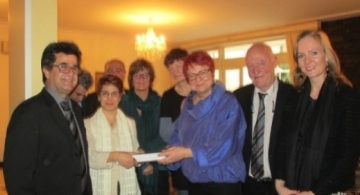
December 27-2013
Seven members of the EU Parliament made a highly publicized visit to Tehran last week and were greeted joyously as evidence that Iran was being welcomed back into the world community—until the EU parliamentarians sneaked off for a meeting with dissidents Jafar Panahi and Nasrin Sotoudeh.

. . . facilitator
That set off angry recriminations and shouts that the Europeans were uncivilized.
The meeting was held inside the Greek Embassy in Tehran, so technically it wasn’t held on Iranian territory, a point no one in the establishment of the Islamic Republic has so far noted.
The entire establishment acted as if it were shocked, shocked by the meeting, just as if they were shocked to learn there was gambling in the back of Rick’s. But the EU parliamentarians had said long before they had left Europe that they wanted to meet the two dissidents in order to present them with the Sakharov Prize for human rights that the EU Parliament awarded them last year. The Iranian establishment had thus been forewarned by the EU, which hid nothing.
No EU parliamentary delegation has been to Iran in five years. Previous efforts to arrange visitors floundered when the parliamentarians said they wanted to visit Mehdi Karrubi and Mir-Hossain Musavi. Since they are under house arrest, the Iranian government controls access to them. When Iran refused to approve such a visit, the EU canceled those visit plans.
This time the EU said the visitors wanted to see Panahi and Sotoudeh, but didn’t ask permission since Panahi and Sotoudeh are free to move around. The one concession to the sensibilities of the Islamic Republic’s establishment was to hold the meeting on foreign ground in the Greek embassy.
The Iranian Foreign Ministry expressed anger for public consumption by summoning the Greek ambassador to hear a protest.
Panahi, a film director, and Sotoudeh, a human rights lawyer, have both been tried and convicted for their dissident activities. Panahi has never been taken to jail to serve his time, perhaps because he has substantial and vocal support in the international movie industry. Sotoudeh spent three years of an 11-year sentence in prison away from her two young children before she was amnestied shortly after Hassan Rohani was inaugurated as president.
She was one of 20 political prisoners to be freed. No more have been released, however.
The good will of the EU visit was essentially wiped out by the Iranian reaction to the Greek embassy meeting. Majlis Speaker Ali Larijani, who was officially the host for the visit, said, “What the EU delegation has done is a cheap and bad move because, when a delegation, travels to a country, it should act according to its working agenda. Holding secret meetings, especially for the Europeans, was a cheap action.”
Actually such visits with dissidents are common in countries that are seen as oppressive and unfree. Parliamentarians visiting the Soviet Union routinely met dissidents, and they rarely bothered to do it under the polite cover of an embassy.
But it turned out the visit wasn’t arranged in secret. Radio Zamaneh in the Netherlands quoted Mohammad-Javad Larijani, the head of Iran’s Human Rights Council, as saying he agreed to the meeting. He said Panahi and Sotoudeh “have been prosecuted and served their sentences and the Islamic Republic has nothing to hide.”
It should be noted that Mohammad-Javad Larijani is the brother of Majlis Speaker Ali Larijani.
Before Mohammad-Javad Larijani revealed his role, Ahmad Khatami, a hardline cleric not related to the former president, expressed fury at the meeting and said, “Those who arranged the European delegation’s meeting with the agents of sedition must be reprimanded and they have to apologize to the people, no matter what rank they hold.”
The EU parliamentarians ended their six-day visit Tuesday just before news of their meeting with Sotoudeh and Panahi leaked out.
The EU delegation’s visit to Iran was not just controversial in Iran. Many in Europe had opposed any such visit at this juncture. UPI reported that five members of the Iran panel in Parliament refused to make the trip to Tehran. The Peoples’ Party, the largest political group in the European Parliament, also refused to assign anyone to the trip.
Critics in Europe maintain that sending any official delegation to Iran without pre-conditions on human rights was just playing into the hands of the Islamic Republic and would be taken by hardliners as a sign that the Europeans really aren’t serious about human rights and the Islamic Republic can do as it chooses.
